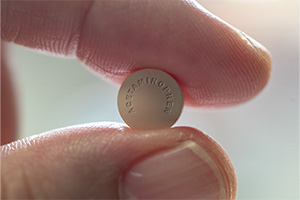
What Is a Chemical Pregnancy? Navigating the Heartbreak of Early Pregnancy Loss
A chemical pregnancy is considered an early miscarriage, happening before the fifth week of pregnancy. The embryo implants in the uterus and produces enough pregnancy hormone (hCG) to trigger a positive pregnancy test.
But when the embryo stops developing, hCG levels fall, and the pregnancy ends before an ultrasound can detect it. It’s far more common than most people realize, accounting for roughly 50% of all recognized early losses.*
At Fertility Specialists of Texas (FST), we know how heartbreaking it is to see a positive test only to watch it turn negative days later. The grief, frustration, and fear are real—but it’s important to know that experiencing a chemical pregnancy does not mean your chances of a healthy pregnancy in the future are lost.
Many people go on to have successful pregnancies with or without the help of fertility treatment.
Chemical Pregnancy or Clinical Pregnancy: Understanding the Difference
| Chemical Pregnancy | Clinical Pregnancy | |
| Timing | Occurs very early, usually before the fifth week | Confirmed after the fifth week, often visible on ultrasound |
| Pregnancy Hormone (hCG) | Rises briefly, then falls when the embryo stops developing | Rises steadily as the pregnancy progresses |
| Ultrasound | Typically cannot detect a gestational sac | Ultrasound can confirm pregnancy and heartbeat |
| Symptoms | Mild cramping, light spotting or bleeding, sometimes no symptoms at all | Early pregnancy symptoms like nausea, breast tenderness, fatigue; symptoms usually persist and increase |
| Fertility Implications | Usually no long-term effect on future pregnancies | Depends on individual circumstances; recurrent losses may need evaluation |
Chemical Pregnancy Symptoms
Because chemical pregnancies happen so early, your symptoms can be subtle—or sometimes not noticeable at all. Common signs can include:
- A positive pregnancy test followed by a negative one a few days later
- Light spotting or bleeding around the time of your expected period
- Mild cramping, similar to period cramps
These symptoms can mimic a typical cycle, which is why so many people don’t realize they’ve had a chemical pregnancy. In many cases, the only clue is a changing pregnancy test or human chorionic gonadotropin (hCG) level. Since this type of loss occurs before most ultrasounds can detect the pregnancy, bloodwork is often the most reliable way to confirm hCG levels.
Why Does Chemical Pregnancy Happen?
Potential factors may include:
- Hormonal imbalances, such as low progesterone
- Uterine abnormalities like fibroids or polyps
- Thyroid conditions
- Blood clotting disorders
One of the hardest questions to face after a chemical pregnancy is why. In most cases, chemical pregnancies occur because of chromosomal abnormalities that prevent the embryo from developing as it should. These are usually random—not caused by anything you did or didn’t do.
Does a Chemical Pregnancy Affect Fertility?
It’s normal to feel worried about future pregnancies after an early loss. The encouraging news is that a chemical pregnancy can actually be a hopeful sign: fertilization and implantation are occurring, which means your body is capable of getting pregnant.
For most people, experiencing a chemical pregnancy does not reduce the chances of a healthy pregnancy in the future. Many people go on to conceive naturally or with the support of fertility treatments.
Fertility treatments, such as in vitro fertilization (IVF), intrauterine insemination (IUI), or IVF with preimplantation genetic testing (PGT), can also support your journey to grow your family.
Finding Meaning in a Chemical Pregnancy
It’s normal to focus on the sadness of a loss, but there can also be a measure of hope here: a chemical pregnancy means that fertilization and implantation are happening. Your body is capable of conceiving, and that is an important step toward a future pregnancy.
You can find comfort in knowing that with the right care and treatment, you can still reach your family-building dreams.
FAQs About Chemical Pregnancies
Moving Forward With Hope
A chemical pregnancy can feel like a painful detour—but it is not the end of your family-building journey. Many patients grow their families after experiencing early pregnancy loss. With compassionate care, advanced fertility options, and emotional support, you have so many possibilities ahead.
If you’ve experienced a chemical pregnancy, know that your feelings are real, your journey matters, and support is available. You are not alone. Taking the next steps with a fertility specialist at Fertility Specialists of Texas can provide reassurance, guidance, and hope for the future.
Request Appointment*Source: What To Expect



